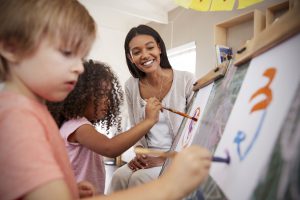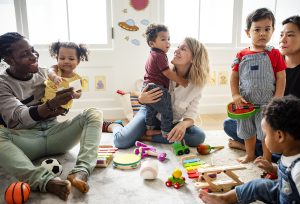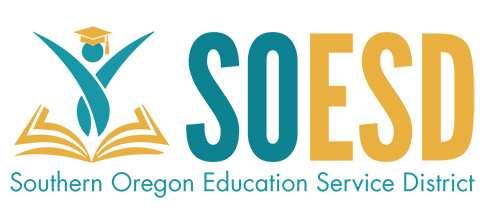Skills related to social and emotional development are the skills that best prepare children for kindergarten and learning. Thank you to our many wonderful partners in Jackson and Josephine Counties who work with children and families every day to ensure they have the support they need to thrive.
-René Brandon, Director of Southern Oregon Early Learning Services
- What We Do
- Free Preschool Promise
- Kaleidoscope & Family Programs
- News & Events
- Meetings & Minutes
- Get Involved
What We Do
 Our mission is to coordinate an early childhood system that is equitable, integrated, accessible, inclusive, anti-racist, and family centered so that all families with young children are supported to ensure their wellbeing and children are thriving in early childhood and beyond.
Our mission is to coordinate an early childhood system that is equitable, integrated, accessible, inclusive, anti-racist, and family centered so that all families with young children are supported to ensure their wellbeing and children are thriving in early childhood and beyond.
Early Learning Hubs are neutral conveners and cross-sector system aligners. We use data analysis and stakeholder input to identify gaps and opportunities. In partnership with other community leaders and members, we invest funding into strategic efforts to increase regional capacity for strategies that are working well and to launch new initiatives that will improve outcomes for families with children 0-5.
The Need
In Jackson and Josephine County:
- 22% of children experience food insecurity
- 53% of families with children birth to age 5 are at or below 200% of the Federal Poverty Line for household size
- 32% of 3rd grade children are reading at grade level
- 550 children are in foster care
- Of the 19,075 children in both counties birth to age 5, 23.5% have access to an early learning opportunity prior to Kindergarten
 Who does SOELS serve?
Who does SOELS serve?
Jackson and Josephine Counties have a regional population of 19,075 children birth to age five. The work we do is to ensure that all families, especially those in the following priority populations, who tend to experience marginalization, have timely access to the resources that they need:
- Experiencing houselessness
- Spanish home language
- Foster/Resource Families
- Child welfare involvement
- Child experiences a disability
- Teen Parents
- Navigating recovery
- Navigating mental health supports
- Living in rural community, low access to services
- At or below 200% FPL
- Lacking access to child care prior to kindergarten

Preschool Promise
Preschool Promise is a free preschool program for eligible families. Eligibility and enrollment for Preschool Promise for the 2024-2025 school year will be coordinated by early learning hubs across the state.
Preschool Promise es un programa preescolar gratuito para familias elegibles. Los centros de aprendizaje temprano en todo el estado coordinarán la elegibilidad y la inscripción para Preschool Promise para el año escolar 2024-2025.
Kaleidoscope Play & Learn Groups:
Click here for current schedule and locations!
Hey Families! We have new locations coming! A few of our groups are changing locations to better serve you, please check out the schedule below!
Visit our website at Southern Oregon Early Learning Hub or contact Teresa Slater Teresa_slater@soesd.k12.or.us for more information.
Kindergarten Partnership and Innovation
Click here for detailed information about this program and the story behind the Kaleidoscope Play & Learn Groups.
Maternal, Infant and Early Childhood Home Visiting
Click here for detailed information about this program.
Looking for a high-quality child care program for your child?
Choosing a preschool can be a challenge! You know your child best and we want to help you feel empowered during what can be both an exciting and stressful time for families.
Click here to learn more about Oregon preschool and child care quality resources.
VROOM
What is VROOM?
Vroom turns shared moments into brain building moments. Whether it’s mealtime, bath time, or anytime in between, there are always ways to nurture our children’s growing minds.
News
Five on 5
SOELS Quarterly Newsletters
Calendars
The Family Connection Calendar of Events
____________________________________________
The Children’s Museum of Southern Oregon
___________________________________________
Jackson County Library Calendar of Events
________________________________________________________
Governance Council Meetings
Next: July 15th, 2025
2:30-4:30 pm
Link to the Agenda
Past Meetings:
May 18th, 2025
Link to the Agenda
GC 05.18.25 Mtg Video
March 19, 2025
Link to the Agenda
GC 03.18.25 Mtg Video
January 21, 2025
GC 01.21.25 Agenda
GC 01.21.25 Slide Deck
September 17, 2024
GC 09.17.24 Agenda
GG 9.17.24 Video
May 21, 2024
GC 05.20.24 Agenda
GC 05.20.24 Minutes Draft
March 19, 2024
GC 03.19.24 Agenda
GC 03.19.24 Minutes Draft
January 16, 2024
GC 01.16.24 Agenda
GC 01.16.24 Minutes
November 21, 2023
GC 11.21.23 Agenda
GC 11.21.23 Minutes
September 19, 2023
GC 09.19.23 Agenda
GC 09.19.23 Minutes
July 18, 2023
GC 07.18.23 Agenda
GC 07.18.23 Minutes
May 16, 2023
GC 05.16.23 Agenda
GC 05.16.23 Minutes
March 21, 2023
GC 03.21.23 Agenda
GC 03.21.23 Minutes
January 17,2023
GC 01.17.23 Agenda
GC 01.17.23 Minutes
November 15, 2022
GC 11.15.22 Agenda
GC 11.15.22 Minutes
September 20, 2022
09.20.22 GC Agenda
GC 09.19.22 Minutes Draft
GC 09.19.22 Slides
July 19, 2022
GC 07.19.22 Agenda
GC 07.19.22 Minutes Pending
Family Survey Summary 2022
Preschool Promise Expansion Challenges July 2022
Social Emotional Health AC JCC 7.2022
May 17, 2022
GC 05.17.22 Agenda
GC 05.17.22 Minutes
Regional Assessment Presentation 04.19.22
March 15, 2022
GC 03.15.22 Agenda
GC 03.15.22 Minutes
February 15, 2022
GC 02.15.22 Agenda
GC 02.15.22 Minutes
January 18, 2022
GC 01.18.22 Agenda
GS 01.18.22 Minutes
Family Engagement Improvement Project Presentation
Kaleidoscope Presentation
No December Meeting
November 16,2021
GC 11.16.21 Agenda
GC 11.16.21 Minutes
October 19, 2021
GC 10.19.21 Agenda
GC 11.19.21 Minutes
HUB Investment Priorities 2021-23
SOELS Budget by Fund for 2021-2023
September 21, 2021
GC 09.21.21 Agenda
GC 09.21.21 Minutes
July 20, 2021
GC 07.20.21 Agenda
GC 07.20.21 Minutes
ELD Legislative Recap Final 6.29.21
June 15, 2021
GC 06.15.21 Agenda
GC 06.15.21 Minutes
19-21 Biennium in Review
Bill Summary 06.04.21
May 18, 2021
GC 05.18.21 Agenda
GC 05.18.21 Minutes
Bill Summary 05.07.21
HB 3073 FAQ
No April Meeting
March 16, 2021
GC 03.16.21 Agenda
GC 03.16.21 Minutes
SOELS Budget Projection for 2021-2023
March 1 EL Hub 21-23 SOW Draft
Bill Summary 03.19.21
February 16, 2021
GC 02.16.21 Agenda
GC 02.16.21 Minutes
January 19, 2021
GC 01.19.21 Minutes
No December Meeting
November 17, 2020
GC 11.17.20 Minutes
October 20, 2020
GC 10.20.20 Minutes
No September Meeting
No August Meeting
July 21, 2020
GC 07.21.20 Agenda
SOELS Conflict of Interest Policy Statement Definitions
GC 07.21.20 Minutes
GC PowerPoint July 2020
June 16, 2020
GC 06.16.20 Agenda
GC 06.16.20 Minutes
May 21, 2020 Retreat
GC 05.21.20 Agenda
April 21, 2020
GC 04.21.20 Agenda
GC 04.21.20 Minutes
March 17, 2020
GC 03.17.20 Agenda
GC 03.17.20 Minutes
February 18, 2020
GC 02.18.20 Agenda
GC 02.18.20 Minutes
January 21, 2020
GC 01.21.20 Agenda
GC 01.21.20 Minutes
2019 Meeting Minutes
No December Meeting
November 19, 2019
GC 11.19.19 Agenda
GC 11.19.19 Minutes
Early Learning Workforce Survey Results
October 15, 2019
GC 10.15.19 Agenda
GC 10.15.19 Minutes
September 17, 2019
GC 09.17.19 Agenda
GC 09.17.19 Minutes
No August Meeting
July 16, 2019
GC 07.16.19 Agenda
GC 07.16.19 Minutes
May 21, 2019
GC 5.21.19 Agenda
GC 5.21.19 Minutes
March 19, 2019
SOELS Retreat Agenda 3.19.19
Documents Shared:
Hub Flowchart Final Draft
Guidance memo to Hubs
OR Public Official Guide
Public Meeting Law Quick Reference Guide
Public Officials & Meeting Law Memo
Dilemmas for GC Members
January 15, 2019
GC 1.15.19 Agenda
GC 1.15.19 Minutes
2018 Meeting Minutes
Backup for each meeting available upon request
GC 11.20.18 Minutes
GC 09.18.18 Minutes
Previously known as Steering Committee
SC 07.17.18 Minutes
SC 05.15.18 Minutes
SC 03.20.18 Minutes
SC 01.16.18 Minutes
2017 Meeting Minutes
Backup for each meeting available upon request
SC 11.21.17 Minutes
SC 09.19.17 Minutes
SC 05.16.17 Minutes
SC 03.21.17 Minutes
SC 01.17.17 Minutes
2016 Meeting Minutes
Agency Advisory Council Meetings
Next: April 9, 2025
10:00-12:00 pm
Click here for link to Minutes beginning 01.13.23
Past Meetings:
April 9, 2025
AAC 04.09.25 Agenda
AAC 04.09.25 Recording
February 14, 2025
AAC 02.14.25 Agenda
AAC 02.14.25 Recording
AAC 02.14.25 Slide Deck
AAC 02.14.25 Resources Shared
September 9, 2022
AAC 09.09.22 Agenda
AAC 09.09.22 Minutes
AAC 09.09.22 2022 So OR Tri4 Youth
AAC 09.09.22 Tri4 Youth Flier Combo
July 8, 2022
07.08.22 AAC Agenda
AAC 07.08.22 Minutes
April 8, 2022
AAC 04.08.22 Agenda
AAC 04.08.22 Minutes
January 14, 2022
AAC 01.14.22 Agenda
AAC 01.14.22 Minutes
Starting Strong Presentation
FEIP Family Engagement Improvement Project
No December Meeting
November 11, 2021
AAC 11.12.21 Agenda
October 10, 2021
AAC 10.10.21 Agenda
AAC 10.10.21 Minutes
September 10, 2021
AAC 09.10.21 Agenda
AAC 09.10.21 Minutes
No July or August Meetings
June 11, 2021
AAC 06.11.21 Agenda
AAC 06.11.21 Minutes
May 14, 2021
AAC 05.14.21 Agenda
AAC 05.14.21 Minutes
Resource Presentation
April 9, 2021
AAC 04.09.21 Agenda
AAC 04.09.21 Minutes
No March Meeting
February 12, 2021
AAC Jan 2021 Agenda
AAC 02.12.21 Minutes
January 8, 2021
AAC 01.08.21 Agenda
AAC 01.08.21 Minutes
November 13, 2020
AAC Nov 2020 Agenda
AAC Nov 2020 Minutes
October, 2020
AAC Oct 2020 Agenda
AAC 10.09.20 Minutes
No August Meeting
July 10, 2020 (Cancelled)
June 12, 2020
AAC 06.12.20 Agenda
AAC 06.12.20.Minutes
May 8, 2020
AAC 05.08.20 Agenda
AAC 5.10.20 Minutes
AAC 05.08.20 Minutes Links
AAC 05.08 PowerPoint
April 10, 2020
(Cancelled)
March 13, 2020
(Cancelled)
February 14, 2020
AAC 02.14.20 Agenda
AAC 02.14.20 Minutes
January 10, 2020
(Cancelled)
No December Meeting
November 8, 2019
(See Stewardship Committee Meeting)
October 11, 2019
AAC 10.11.19 Agenda
AAC 10.11.19 Minutes
September 13, 2019
AAC 9.13.19 Agenda
AAC 9.13.19 Minutes
August 9, 2019
AAC 8.9.19 Agenda
AAC 8.9.19 Minutes
No July Meeting
June 14, 2019
AAC 6.14.19 Agenda
AAC 6.14.19 Minutes
May 10, 2019
AAC 5.10.19 Agenda
AAC 5.10.19 Minutes
April 12, 2019
AAC 4.12.19 Agenda
AAC 4.12.19 Minutes
March 8, 2019
AAC 3.8.19 Agenda
AAC 3.8.19 Minutes
February 8, 2019
AAC 2.8.19 Agenda
AAC 2.8.19 Minutes
January 11, 2019
AAC 1.11.19 Agenda
AAC 1.11.19 Minutes
2018 Meeting Minutes
No December Meeting
November 2018
2017 Meeting Minutes
2016 Meeting Minutes
Educational Equity Committee Meetings
Next: October 7, 2024
1:00-2:00 pm
Click here for link to Minutes beginning 02.06.23
Past Meetings:
February 6, 2023
Equity 02.06.23 Agenda
December 5th, 2022
Equity 12.05.22 Minutes
October 3, 2022
Equity 10.03.22 Agenda
Equity 10.03.22 Minutes
June 23, 2022
Equity 06.23.22 Agenda
Equity 06.23.22 Minutes
Family Survey – Summer 2022
May 26, 2022
Equity 05.26.22 Agenda
April 28, 2022
Group attended The Mary Pauper Papers: Racial Equity & the ECE Workforce virtual webinar.
February 24, 2022
Equity 02.24.22 Agenda
Equity 02.24.22 Minutes
No Dec or Jan Meetings
No Oct or Nov Meetings
September 23, 2021
Equity 09.23.21 Agenda
No August Meeting
July 22, 2021
Equity 07.22.21 Agenda
Equity 07.22.21 Minutes
Belonging through a Culture of Dignity Ch 7 July 2021
June 24, 2021
Equity 06.24.21 Agenda
Equity 06.24.21 Minutes
Beyond Dignity Power Point Chapters 4 & 5
Equity May – June 2021
May 27, 2021
Equity 05.27.21 Agenda
Equity 05.27.21 Minutes
Draft of Shared Vision Statement for SOELS Educational Equity Committee
HCDC Racism Brief
Equity May – June 2021
April 22, 2021
Equity 04.22.21 Agenda
Equity 04.22.21 Minutes
Draft Equity Statement
No March Meeting
Feb. 25, 2021
Equity 02.25.21 Agenda
Equity 02.25.21 Minutes
Equity 02.25.21 Shared Vision
January 28, 2021
Equity 01.28.21 Agenda
Equity 01.28.21 Minutes
October 22, 2020
Equity 10.22.20 Minutes
No August Meeting
July 23, 2020
June, 2020
May 28, 2020
April 23, 2020
ECE Workforce Committee Meetings
Next: October 3, 2024
10:30-12:00 pm
Click here for link to Minutes beginning 01.05.23
Past Meetings:
Jan. 5, 2023
WRK 01.05.23 Agenda
Nov. 3, 2022
WRK 11.03.22 Agenda
WRK 11.03.22 Minutes
WRK 11.03.22 Work Plan
September 9, 2022
WRK 09.01.22 Agenda
July 7, 2022
WRK 07.07.22 Minutes
WRK 07.22 Ecosystem Condition Handout
WRK Raise Up Oregon ES Web Version 19.01.14
WRK Regional System Assessment Overview
WRK 07.06.22 Regional System Assessment Overview
WRK 07.07.22 RA Session 1
May 5, 2022
WRK 05.05.22 Agenda
WRK 05.05.22 Minutes
March 3, 2022
WRK 03.03.22 Agenda
WRK 03.03.22 Minutes
January 6, 2022
WRK 01.06.22 Agenda
WRK 01.06.22 Minutes
WRK 12.2021 Strategic Planning Notes
December 2, 2021
WRK 12.02.21 Agenda
WRK 12.02.21 Minutes
No November Meeting
October 7, 2021
WRK 10.07.21 Agenda
WRK 10.07.21 Minutes
Arkansas IECMHC for Oregon 3.5.21
Healthcare Flyer English
Healthcare Flyer Spanish
Registration is now open for webPD
September 2, 2021
WRK 09.02.21 Agenda
WRK 09.02.21 Minutes
No August Meeting
July 1, 2021
WRK 07.01.21 Agenda
WRK 07.01.21 Minutes
Child Care Needs Survey Results
June 3, 2021
WRK 06.03.21 Agenda
WRK 06.03.21 Minutes
May 6, 2021
WRK 05.06.21 Agenda
WRK 05.06.21 Minutes
Early Learning Educator Survey Results
ECE Incentive Mini Grant Summary
RCC Info Session Flyer
SOU Bridge Scholarships flyer
April 1, 2021
WRK 04.01.21 Agenda
WRK 04.01.21 Minutes
March 4, 2021
WRK 03.04.21 Agenda
WRK 03.04.21 Minutes
Caregivers-Participant-Flyer
Caregivers Recruitment Map
February 4, 2021
WRK 02.04.21 Minutes
January 7, 2021
WRK 01.07.21 Minutes
December 3, 2020
WRK 12.03.20 Minutes
November 5, 2020
October 1, 2020
September 3, 2020
No August Meeting
July 2, 2020
June 4, 2020
May 5, 2020
March 4, 2020
February 6, 2020
January 2, 2020
Stay Informed
To view our Facebook, Click Here
To learn more about participating in one of our regional collaboratives, or to subscribe to our mailing list, please email Jordan_Rogers@soesd.k12.or.us
Become a Child Care Provider
Donate
Sponsor the Expansion of Child Care in Rural Communities in Jackson and Josephine counties
Donate Today!
Sponsor Child Care Slots in Local Child Care Programs for Families Who Can’t Afford It
Donate Today!
Sponsor a Teacher’s Education
Donate Today!
Sponsor Specialized Supports in Child Care Classrooms to Support the Needs of Children
The following Child Care Champions have provided more than $1.4Million in the last year for the child care needs in Southern Oregon. Will YOU join us?
- AllCare
- City of Ashland
- City of Grants Pass
- Jefferson Regional Health Alliance
- Jackson Care Connect
- Gordon Elwood Foundation
- Providence Foundation
- SOREDI
- Southern Oregon Success
- Rogue Workforce Partnership

